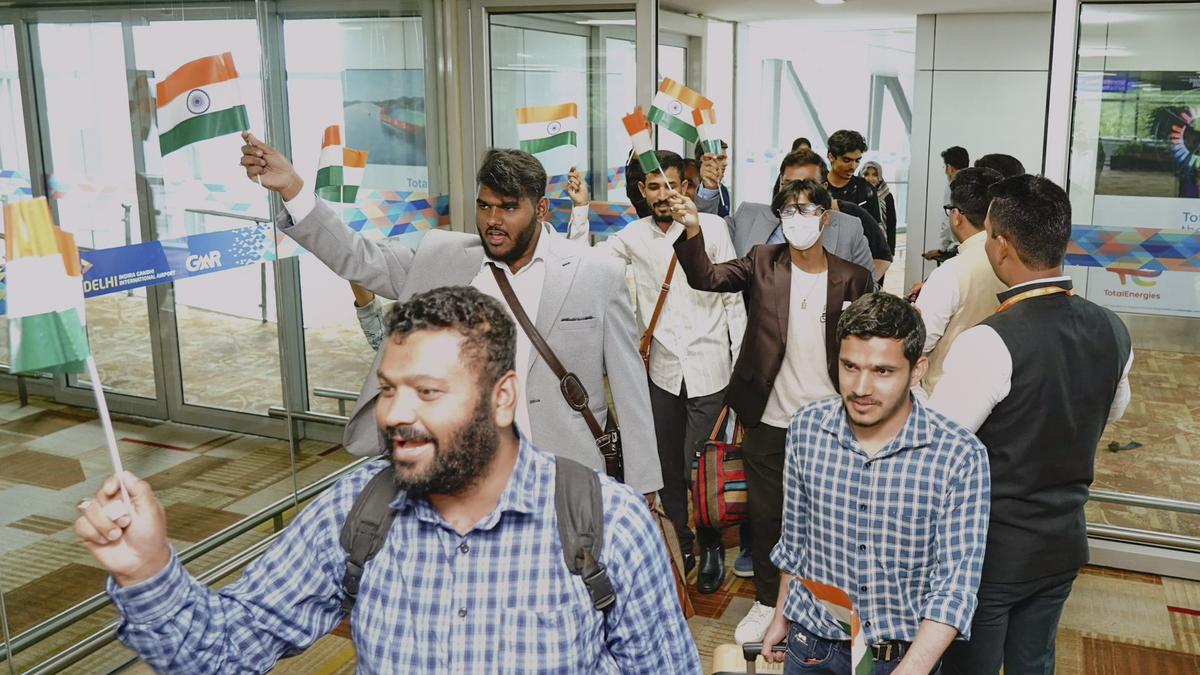
In this image released by @MEAIndia via X on June 24, 2025, people evacuated from Iran under Operation Sindhu are seen upon their arrival at Delhi airport.
| Photo Credit: X/@MEAIndia via PTI
On June 13, Israel struck Iranian targets in several provinces, even as it continued its war against Hamas. Its conflict with Iran in an already unstable West Asia lasted 12 days.
India’s response to the Israel-Iran conflict was cautious. India called for restraint and de-escalation to maintain peace in the region. Prime Minister Narendra Modi has repeatedly expressed concern for humanitarian losses and has reiterated that this cannot be an era of war. Under his leadership, the Indian government has been quick to provide humanitarian aid when requested; voted in favour of a permanent ceasefire in Gaza at the United Nations General Assembly; and swiftly evacuated its citizens from conflict zones. Most recently, as part of Operation Sindhu, India evacuated citizens, mostly medical students, from Israel and Iran.
Ground Zero | Operation Sindhu: Fear, flight, and an uncertain future
A sign of strength
The world recognises India’s growing credibility and diplomatic weight. India’s strategic silence is a sign of its growing stature — it speaks when it matters most, acts when it counts, and leads when it is required to. India has strategic interests in West Asia, including close defence co-operation with Israel, energy and trade ties with Iran, and a large diaspora spread across many Gulf countries. One of Prime Minister Modi’s diplomatic successes has been to overhaul ties with Arab nations so much so that some of them have become India’s largest foreign investors and trading partners. For India, the fourth largest global economy, economic ties have to take centre stage in diplomatic calculations. To unnecessarily intervene in a war which is not ours is against national interests and irresponsible. Being able to maintain an independent stance doesn’t betray India’s values; rather, it allows the country to engage with all sides and assert its interests more deliberately.
Today’s international diplomacy prioritises protecting national interests. The recent Pakistan-led terror attacks in Pahalgam, India’s retaliative Operation Sindoor, and the subsequent global response to the India-Pakistan conflict were telling of the changing geopolitical times we live in. Over the years, several nations, particularly western powers and multilateral bodies, which are seemingly against terror, have extended funds and other military support to embolden Pakistan, a known sanctuary to terror groups. The western world, a large part of which has worked overtime to build strategic relationships with India, once again re-hyphenated Pakistan and India, which the Indian government had managed to de-hyphenate in its past two terms. Several countries remain oblivious to Pakistan’s official role in sponsoring terror activities, many of which are directed towards India, so that they can obtain access to ports and airbases in Pakistan, which will provide an edge to them in their own conflicts with Iran and China. Pakistan’s loyalty, which seems to be on sale to the highest bidder, is being courted with loans from the International Monetary Fund, state-of-the-art military equipment, and lunches with its leaders. The irony is that the same countries which are often quick to give lectures on democracy and invade nations to “protect democratic values” are eager to engage with Pakistan’s unelected military regime because it suits their interests. The Arab world, despite growing ties with India, is also quick to side with Pakistan as it is bound by religious brotherhood with the country. India’s foreign policy calculations take into account all these nuances. India’s diplomatic position also prioritises its own national interests, security, value system, and growth story.
West Asia is one of the most politically unstable regions in the world. There are multiple ongoing and recurring conflicts and a network of non-state actors in the region. In such a highly volatile environment, to be in possession of nuclear weapons would dramatically increase the risk of escalation and unauthorised use. Nuclear weapons could lead to prolonged conflicts and have disastrous consequences on civilians. The Treaty on the Non-Proliferation of Nuclear Weapons is already under pressure. A nuclearised West Asia will embolden other conflict regions such as in parts of Africa and South America to pursue more aggressive nuclear weapons acquisition programmes. A stable West Asia requires arms control, de-escalation, and regional cooperation.
COMMENT | Blame not the messenger in India’s diplomacy
Selective outrage
Often, ill-informed preaching, which is often politically motivated, demonstrates a limited understanding of today’s evolving global dynamics. India cannot selectively ignore the role of Iran in destabilising the region. Indian diplomats cannot ignore the horrific October 7, 2023, attack by Hamas on Israel or its use of civilian Palestinian infrastructure as a shield in diplomatic response calculations. Selective outrage and heated opinions often disguised as moralistic views run a dangerous undercurrent against the core interests of the country. Many people hold views that are passionate but under-informed. If their opinions are taken seriously, it could lead to dire diplomatic consequences and stall India’s strong economic progress.
India’s strategic autonomy reflects its quiet confidence, conviction, and clarity. We live in an India that is confident of its growth story. This is also an India that is capable of maintaining its own opinions and upholding the ability to engage with both warring sides instead of getting swayed into making public statements due to pressure from any one side during global conflicts.
Priyam Gandhi-Mody, Director of VishwaMitra Research Foundation, a Mumbai-based foreign policy think tank.
Published – July 07, 2025 12:12 am IST
